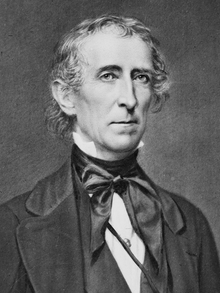John Tyler (March 29, 1790 – January 18, 1862) was the tenth president of the United States, holding office from 1841 to 1845 after briefly serving as the tenth vice president in 1841; he was elected vice president on the 1840 Whig ticket with President William Henry Harrison. Tyler ascended to the presidency after Harrison's death in April 1841, only a month after the start of the new administration. He was a stalwart supporter and advocate of states' rights, and he adopted nationalistic policies as president only when they did not infringe on the powers of the states. His unexpected rise to the presidency posed a threat to the presidential ambitions of Henry Clay and other politicians, and left Tyler estranged from both major political parties.
Tyler was born to a prominent Virginia family of slaveholders and became a national figure at a time of political upheaval. In the 1820s, the nation's only political party was the Democratic-Republican Party, and it split into factions. Tyler was initially a Democrat, but he opposed Andrew Jackson during the Nullification Crisis, seeing Jackson's actions as infringing on states' rights, and he criticized Jackson's expansion of executive power during the Bank War. This led Tyler to ally with the Whig Party. He served as a Virginia state legislator, governor, U.S. representative, and U.S. senator. He was put on the 1840 presidential ticket to attract states' rights Southerners to a Whig coalition to defeat Martin Van Buren's re-election bid.
President Harrison died just one month after taking office, and Tyler became the first vice president to succeed to the presidency without election. He served longer than any other president in U.S. history not elected to the office. To forestall constitutional uncertainty, Tyler immediately took the oath of office, moved into the White House, and assumed full presidential powers—a precedent that governed future successions and was codified in the Twenty-fifth Amendment. Tyler signed into law some of the Whig-controlled Congress's bills, but he was a strict constructionist and vetoed the party's bills to create a national bank and raise the tariff rates. He believed that the president should set policy rather than Congress, and he sought to bypass the Whig establishment, led by Senator Henry Clay of Kentucky. Most of Tyler's Cabinet resigned soon into his term, and the Whigs dubbed him His Accidency and expelled him from the party. Tyler was the first president to see his veto of legislation overridden by Congress. He faced a stalemate on domestic policy, although he had several foreign-policy achievements, including the Webster–Ashburton Treaty with Britain and the Treaty of Wanghia with Qing China.
The Republic of Texas separated from Mexico in 1836. Tyler was a firm believer in manifest destiny and saw its annexation as providing an economic advantage to the United States, so he worked diligently to make it happen. He initially sought election to a full term as president, but he failed to gain the support of either Whigs or Democrats and withdrew in support of Democrat James K. Polk, who favored the annexation of Texas. Polk won the election, Tyler signed a bill to annex Texas three days before leaving office, and Polk completed the process. When the American Civil War began in 1861, Tyler sided with the Confederacy and won election to the Confederate House of Representatives shortly before his death. Some scholars have praised Tyler's political resolve, but historians have generally given his presidency a low ranking. Today, he is seldom remembered in comparison to other presidents and maintains only a limited presence in American cultural memory.
Last Updated: June 9, 2021

























